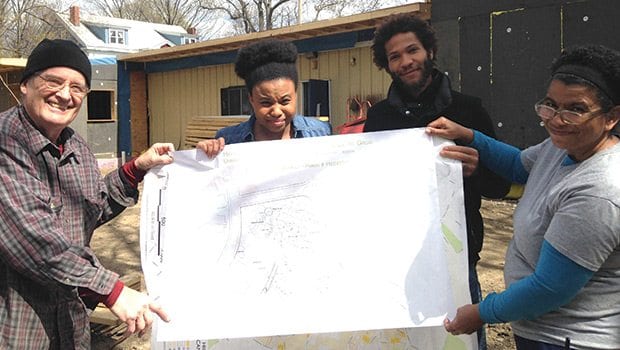
It might be hard to believe today, but long ago Roxbury was a land of farms and apple orchards that produced delicious cider. A partnership between two community organizations now plans to revive some of that history while also investing in a piece of land that has long sat vacant.
The Roxbury Historical Society is partnering with the Hawthorne Youth Community Center to purchase fifty Roxbury russet apple trees from a Maine orchard and sell the saplings at low prices to local organizations and residents. The proceeds from the sales will go to the HYCC, which also plans to purchase a few of the trees for itself and plant them on a land parcel next to its youth center.
The project’s emphasis is on revitalization of an old local resource.
“The fundraising is important, but not as important as finding buyers that know what they’re getting into [in terms of plant care],” said Jon Ellerton, the RHS clerk who has also been involved with HYCC for many years.
The RHS has a century-old history in the area and was revived a few years ago after a period of dormancy by its president, state Representative Byron Rushing. The organization’s treasurer, Marcia Butman, is also the director of Discover Roxbury.
A local relic
The Roxbury russet is an apple tree that was developed locally in the 1630s and quickly became known for its ability to keep over long periods of time. Ellerton says that is why the apple soon was given its own distinct name.
“If you had a tree that was exception, you’d name it — you’d have bragging rights,” he says.
Ellerton says the history of the russet reveals a bigger story of Roxbury’s evolution. The entire area was once well-known for its orchards, lending names that stick around today, such as Orchard Gardens and Warren Street, named after the Warren family that had a large estate there in the 18th century.
Ellerton notes, however, that that family did not have such good memories associated with apple trees — the patriarch reportedly died from falling out of one.
“There are nice associations with apple trees, and there are bad associations,” Ellerton jokes.
He also says the trees played an important role in the American revolutionary war, when soldiers would cut them down and paint them black to make them look like cannons and scare nearby British troops.
Planting a future
The apple trees will arrive in mid-May from Fedco Seeds in Maine. It will take several years for them to start producing fruit.
The tree project is part of HYCC’s plans to make more intentional use of city-owned land next to the youth center. The organization has a license to use the land and has initiated some activity on it, including construction of raised flower beds there three years ago.
“We’re doing what we can to make it a beautiful place and invite neighbors to know it’s our green space,” says Stacy Hill-Sutherland, a youth worker with HYCC who grew up in the program and remained involved ever since.
Eventually, the group hopes to gain full land ownership so they can invest in more resource-heavy projects and be confident in the future of the space.
The plot currently is zoned for housing. However, Hill-Sutherland says, the city “has gotten the message loud and clear that this needs to stay a community resource,” and, she says, signaled a willingness to discuss a transition to full ownership by HYCC.
Ellerton adds that the community also is on board.
“The entire neighborhood has been supportive over the years to get the city to rezone the vacant land,” he says.
In that vein, the group is forging ahead with their tree-planting plans, which Ellerton describes as “an act of faith.”
The piece of land held special significance to Samantha Sadd, the organization’s longtime director who passed away in February at the age of 74. Ellerton and Hill-Sutherland say that Sadd often described the plot as the next phase for the organization’s growth.
The land will provide not only apples, but also opportunities for hands-on education, where young people can learn about agriculture, natural sciences, and nutrition – perhaps one day producing their own locally-grown apple cider for neighbors.
HYCC
Hawthorne Youth Community Center was formed in 1967, although it has moved homes several times since then. It began as a teen club in the basement of a nearby building, later expanding its programming in 1970 when it moved to a three-story building on Fulda street.
Three years later, HYCC faced a serious setback when the property burned to the ground, but its programs continued thanks to donated space until it was able to raise the funds to build a new, one-room facility on the original Fulda Street location.
Aside from the issue of the land plot, HYCC now is expanding with the construction of two additions to its current one-room space. The construction began in October 2014 and is expected to be completed this summer.
When finished, the center will boast a new computer lab and about twice as much space to host youth programs. On top of that, it also will be highly energy efficient. Constructed with thick layers of insulation, planners say the building will maintain a comfortable 68 degrees during the winter through the equivalent of the amount of energy used by a hairdryer.






